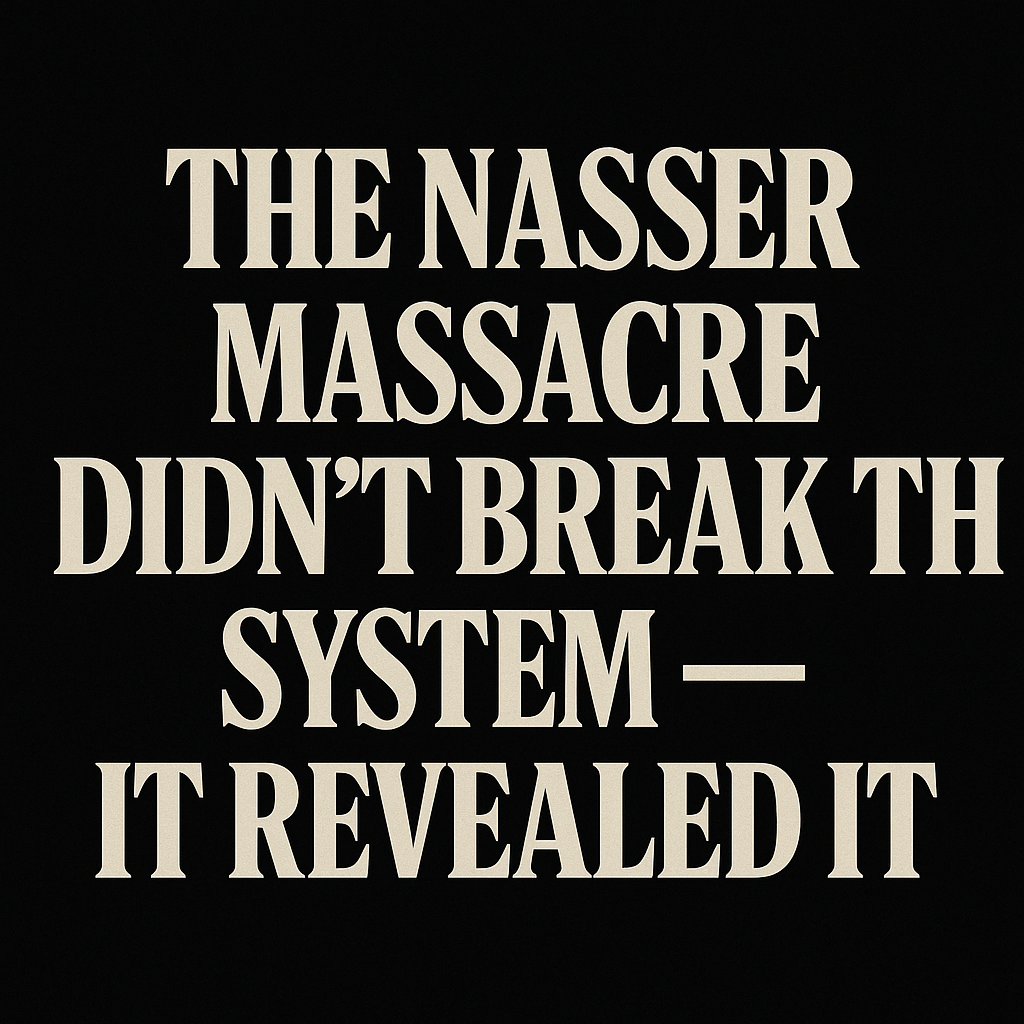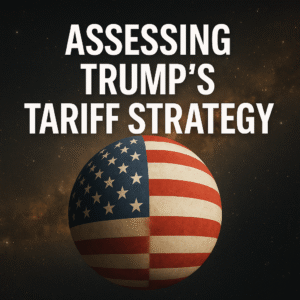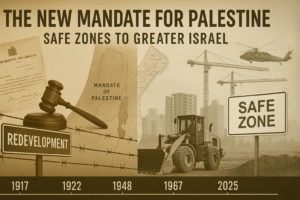The Nasser Massacre Didn’t Break the System — It Revealed It’s True Face
On the 25th of August 2025, Israeli forces launched a double airstrike on Nasser Hospital in Khan Younis. The first missile struck the fourth floor, where emergency and surgical units were located. Minutes later, a second hit as journalists, medics, and rescuers arrived. At least twenty people were killed, including five journalists from outlets such as Reuters, AP, Al Jazeera, and Middle East Eye. Dozens more were injured.
The global response followed a familiar, hollow script. The United Nations condemned the attack and called for Israel to investigate itself. This response, echoed by Western capitals, was not rooted in genuine outrage but theatrical diplomacy. Asking a regime repeatedly accused of war crimes to investigate its own conduct is not oversight. It reveals the real purpose of international institutions: to protect the powerful.
This strike was not an anomaly. Since October 2023, more than 500 healthcare workers have been killed and 136 medical facilities targeted. Gaza’s health system now lies in ruins. A UN Commission of Inquiry found these assaults were intentional, part of an extermination strategy. The systematic denial of water, electricity, and medicine has pushed over two million people into humanitarian collapse. Yet the same institutions that issued warnings now fall silent as their calls are ignored.
What amplifies the offence of the UN’s demand for investigation is the sheer absurdity of it. Israel is permitted to play judge, jury, and executioner. Palestinians are denied the right even to present evidence. Meanwhile the label Hamas — applied without proof — is enough to justify drone strikes, home demolitions, and indefinite detention. Israel remains a “law-abiding democracy” even as it pulverises hospitals and defies international law.
This betrayal is not accidental. The international order was never designed to deliver justice. Post-1945 institutions including the UN were established to preserve the power of victors, not enforce equality. For Western powers, Israel is a civilisational partner, shielded by diplomatic, military, and legal levers even in the face of mass killing. Palestinian suffering gets packed into the language of tragic accidents and unintended consequences.
Justice will never emerge from systems built by oppressors. Justice must be forced into existence through strength, unity, and self-determination.
Consider the targeted killing of Al Jazeera correspondent Anas al-Sharif, who was assassinated by an Israeli airstrike on August 10, 2025, near Al-Shifa Hospital in Gaza. He was reporting from a media tent when the strike hit, killing him, four colleagues, and his nephew. Immediately, Israeli officials claimed he was a member of Hamas. No evidence was provided. Yet Western media outlets widely circulated this accusation, often uncritically, embedding it into headlines and opening paragraphs as though it justified his killing.
But the central issue is not whether al-Sharif was affiliated with Hamas. The issue is that once the Hamas label is attached, all legal norms are abandoned. There is no investigation, no trial, no process. The label alone is treated as sufficient justification for execution by airstrike. This is the inverse of how legal standards are applied when roles are reversed. If an Israeli journalist were killed under similar conditions by Palestinian forces, the international reaction would not be to question whether he had ties to the Israeli military or intelligence. It would be to denounce the killing as a war crime and demand consequences.
The killing of al-Sharif reveals a critical truth: in the international order, Palestinians — and by extension the broader Muslim world — are not afforded the status of legal persons. Their guilt is presumed, their execution permitted, and their humanity negotiable. The invocation of “Hamas” functions not as a factual claim but as a ritual incantation, designed to strip the victim of rights and the aggressor of responsibility.
This is not just hypocrisy. It is structural. It exposes a global system that operates on the logic of power, not law. The law is invoked selectively, only where it serves imperial interests. Where it does not, it is quietly ignored.
This reality must disabuse us of any lingering illusions about the justice of international institutions. Their function is not to protect the weak, but to shield the strong. For the Muslim world, this is not a grievance — it is a strategic imperative. We cannot rely on a system that sees us only through the lens of threat and expendability. We must construct our own architecture of protection, power, and political independence.
For the Muslim world, this moment must mark a turning point. We must reject the myth of impartial institutions and the meaningless gestures of human rights diplomacy. The United Nations, the International Criminal Court, and Western NGOs have consistently failed the Ummah. They speak of justice only when it does not threaten the global hierarchy. Their investigations occur only when outcomes are predetermined. Their condemnations align with diplomatic convenience.
We must turn away from this architecture of hypocrisy. We must invest in independent institutions — political, military, economic — that serve our interests. We must build alliances rooted in shared values, free media, and narrative autonomy. Self-governance is not idealism — it is necessity. Without it, we remain trapped in cycles of suffering, performative outrage, and inaction.
The people of Gaza are not passive victims. They are witnesses to the collapse of a global order that claims to uphold human dignity even while enabling its erosion. Their courage should not compensate for our weakness. As an Ummah, we owe them more than tears. We owe them action.
Yet, as painful as it is to admit, the root of the tragedy in Gaza lies in our fragmentation. The inability of the Muslim world to construct a coherent, unified response to successive expansionist actions by the settler colonial state has made this genocide not just possible but inevitable. Every failure to respond emboldens further aggression. Every silence signals consent. Every lack of consequence invites the next boundary to be pushed. This trajectory leads to one outcome — the full occupation of Palestine and the erasure of its indigenous people.
Our fragmentation, reliance on external powers, and strategic disunity have handed our lands to militarised colonialists. The Zionist agenda has always aimed not for security, but supremacy. Not coexistence, but erasure.
We must not merely question the legitimacy of a system built on hypocrisy. We must reject it outright. Liberation will not come from UN resolutions or Western committees. It will come from the revival of a political will that refuses to be governed by those who see our lives as expendable and our suffering as negotiable.
The time has come to stop waiting for justice. The time has come to prepare to deliver it ourselves — through unity, strength, and unwavering resolve to reclaim control over our collective destiny.



